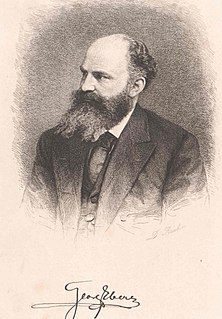A Quote by Sigmund Freud
What good to us is a long life if it is difficult and barren of joys, and if it is so full of misery that we can only welcome death as a deliverer?
Related Quotes
There are hundreds of thousands of microbes surrounding us, but they cannot harm us unless we become weak, until the body is ready and predisposed to receive them. There may be a million microbes of misery floating about us. Never mind! They dare not approach us, they have no power to get a hold on us, until the mind is weakened. This is the great fact: strength is life. Weakness is death. Strength is felicity, life eternal, immortal. Weakness is constant strain and misery: weakness is death
Birth leads to death, death precedes birth. So if you want to see life as it really is, it is rounded on both the sides by death. Death is the beginning and death is again the end, and life is just the illusion in between. You feel alive between two deaths; the passage joining one death to another you call life. Buddha says this is not life. This life is dukkha - misery. This life is death.
We do not know whether it is good to live or to die. Therefore, we should not take delight in living, nor should we tremble at the thought of death. We should be equiminded towards death. This is the ideal. It may be long before we reach it, and only a few of us can attain it. Even then, we must keep it constantly in view, and the more difficult it seems of attainment, the greater should be the effort we put forth.
So long as the law considers all these human beings, with beating hearts and living affections, only as so many things belonging to the master - so long as the failure, or misfortune, or imprudence, or death of the kindest owner, may cause them any day to exchange a life of kind protection and indulgence for one of hopeless misery and toil - so long it is impossible to make anything beautiful or desirable in the best-regulated administration of slavery.
I cannot regret it. They tell us in the temple that true joy is found only in freedom from the Wheel that is death and rebirth, that we must come to despise earthly joy and suffering, and long only for the peace of the presence of the eternal. Yet I love this life on Earth, Morgan, and I love you with a love that is stronger than death, and if sin is the price of binding us together, life after life across the ages, then I will sin joyfully and without regret, so that it brings me back to you, my beloved!
We are left with nothing but death, the irreducible fact of our own mortality. Death after a long illness we can accept with resignation. Even accidental death we can ascribe to fate. But for a man to die of no apparent cause, for a man to die simply because he is a man, brings us so close to the invisible boundary between life and death that we no longer know which side we are on. Life becomes death, and it is as if this death has owned this life all along. Death without warning. Which is to say: life stops. And it can stop at any moment.
I don't see [the jungle] so much erotic. I see it more full of obscenity. It's just - Nature here is vile and base. I wouldn't see anything erotical here. I would see fornication and asphyxiation and choking and fighting for survival and growing and just rotting away. Of course, there's a lot of misery. But it is the same misery that is all around us. The trees here are in misery, and the birds are in misery. I don't think they sing. They just screech in pain.
By 'coming to terms with life' I mean: the reality of death has become a definite part of my life; my life has, so to speak, been extended by death, by my looking death in the eye and accepting it, by accepting destruction as part of life and no longer wasting my energies on fear of death or the refusal to acknowledge its inevitability. It sounds paradoxical: by excluding death from our life we cannot live a full life, and by admitting death into our life we enlarge and enrich it.





































